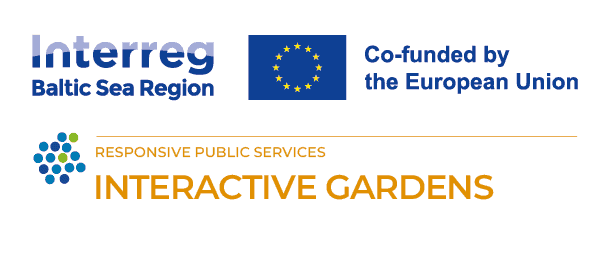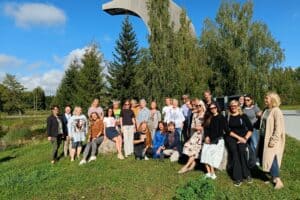
Exchange visits on gardening for different community needs end with inspiration
13 September 2024
The Baltic Sea Region Programme project “Interactive Gardens” has completed its phase with experience exchange visits. In joint meetings, project representatives shared the partners’ experiences and generated new ideas for creating gardens and activities accessible to the public. After the meeting in Zemgale in May this year, project meetings were organised in the other partner countries – Denmark, Finland, Estonia and Lithuania.
In Denmark, project participants got to know Aarhus University’s cooperation with an open-air museum, showing vegetable varieties and environmentally friendly growing techniques to different groups of society. Both practical work and research for students and pupils take place here, as well as an opportunity for people from local communities to meet and work together.
Colleagues from Finland presented the principles of creating a therapeutic garden, planning and the involvement of residents in its creation. The project participants visited the Elonkierto nature park, which was created in close cooperation between the Institute of Natural Resources, local governments, entrepreneurs and communities. On the nature trail, visitors can learn how to carefully use nature’s gifts – edible and medicinal wild plants. Next, the partners got to know the agricultural plants grown in Finland – observing them in nature, getting information from the stands located there, as well as tasting local products, Awareness of the environment is promoted here by organising creative activities for both children and adults, using materials from Finnish nature and countryside.
Estonian colleagues shared their experience of introducing meadow plants into Tartu’s lawns, which need to be mowed less often to reduce noise and dust in the city. On hot summer days, such lawns provide more moisture and cool the air, making the environment more pleasant. In Rakvere, the transformation of a former gravel quarry into a beautiful, green space for sport, recreation and cultural events was demonstrated.
Lithuanian colleagues in Birži and their surroundings showed how to discover history, explain geological processes and preserve cooking traditions with the help of stories, visual materials and the involvement of visitors. Sinkholes, which are still forming, are a defining element of the Birži area and are still forming, for example, 49 new sinkholes have been registered this year. Although it is an everyday challenge for the residents of the Biržu district, to which they have to adapt, sinkholes are also an interesting tourist destination – for example, the Kirkili nature park and the observation tower have been one of the most popular attractions in Lithuania.
Summary from visit in Lithuania
The purpose of the project is to develop gardens accessible to the public for maintaining health, getting the feeling of a garden and educating visitors both by using smart and innovative tools and by seeing and feeling the plants and environment in the surroundings more closely. The project partners will also take care of the exchange of information between neighboring countries, so that the various activities in the gardens are better known and easier to find. The project is managed and supervised by specialists from the Zemgale planning region. In the first year of the project, experience was exchanged between partners, and educational and health-promoting activities were organized in cooperation with non-governmental organizations. Garden planning, design, information preparation and virtual model development are mostly still ongoing.





